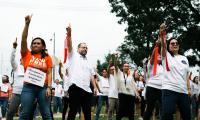COVID-19 did not stop the networks of the NHRIs from promoting human rights

When the COVID-19 pandemic forced NANHRI to hold its scheduled workshops and other activities online, the regional network of national human rights institutions in Africa realised how many of the African NHRIs were prevented from participating. Either due to bad internet connection, fear of cyberattack and surveillance or lack of digital skills.
The analysis focuses specifically on the partners and activities related to the global NHRI EU project, that supports capacity development of national human rights institutions and their networks. Read more here.
“The COVID-19 pandemic forced us to embrace and sharpen our digital skills. This was critical in helping us efficiently serve our members. The pandemic also made us realise that we needed strong ICT infrastructure and highly internet connection. The same was required of our members and we advised them as such. Efficient and reliable infrastructure ensured seamless communication, monitoring of the situation and sharing of experiences for peer learning. Although internet is expensive and sometimes unstable in some African countries, the challenges were addressed with back-up plans to ensure seamless service delivery even in the context of working from home. In some cases, we facilitated internet connections for our members,” Gilbert Sebihogo, the Executive Director at Network of African National Human Rights Institutions, (NANHRI) says.
Adapting to the new digitalised reality
A new report sheds lights on the challenges and the many lessons learned by NANHRI, the three other regional networks of national human rights institutions as well as the Global Alliance of National Human Rights Institutions (GANHRI). The analysis focuses specifically on the partners and activities related to the NHRI EU project, and overall it concludes that the regional networks and GANHRI despite many different challenges managed to adapt to the new digitalised reality and implemented the majority of the activities they planned. The project also shows lessons learned for the future programming using digital technology.
Capacity building of NHRIs continue despite COVID-19
“Like many other organisations, who work globally and are used to travel extensively and gather in face to face meetings and workshops, the networks of NHRIs have had to adapt to a new digitalised reality. The fact, that the networks have been able to implement most of the planned activities tells us that their activities related to for instance human rights defenders have not been delayed. Hopefully their experiences can inspire many others,“ Nieves Molina, project manager at the Danish Institute for Human Rights and one of the authors of the report, says.
Due to the uncertainty of the future, with potential climate crises, global pandemics, or situations of war and unrest, she believes that the analysis will be helpful to ascertain best practices of digitalisation and ensure that future activities and projects are readily adaptable to digital implementation.
“While implementing human rights projects, organisations should deliver due diligence to ensure that they not put vulnerable actors at a higher risk than they are already facing. Ensuring that we take steps towards ensuring safe online communications is one of the obligations that we should accept,” Nieves Molina says.
